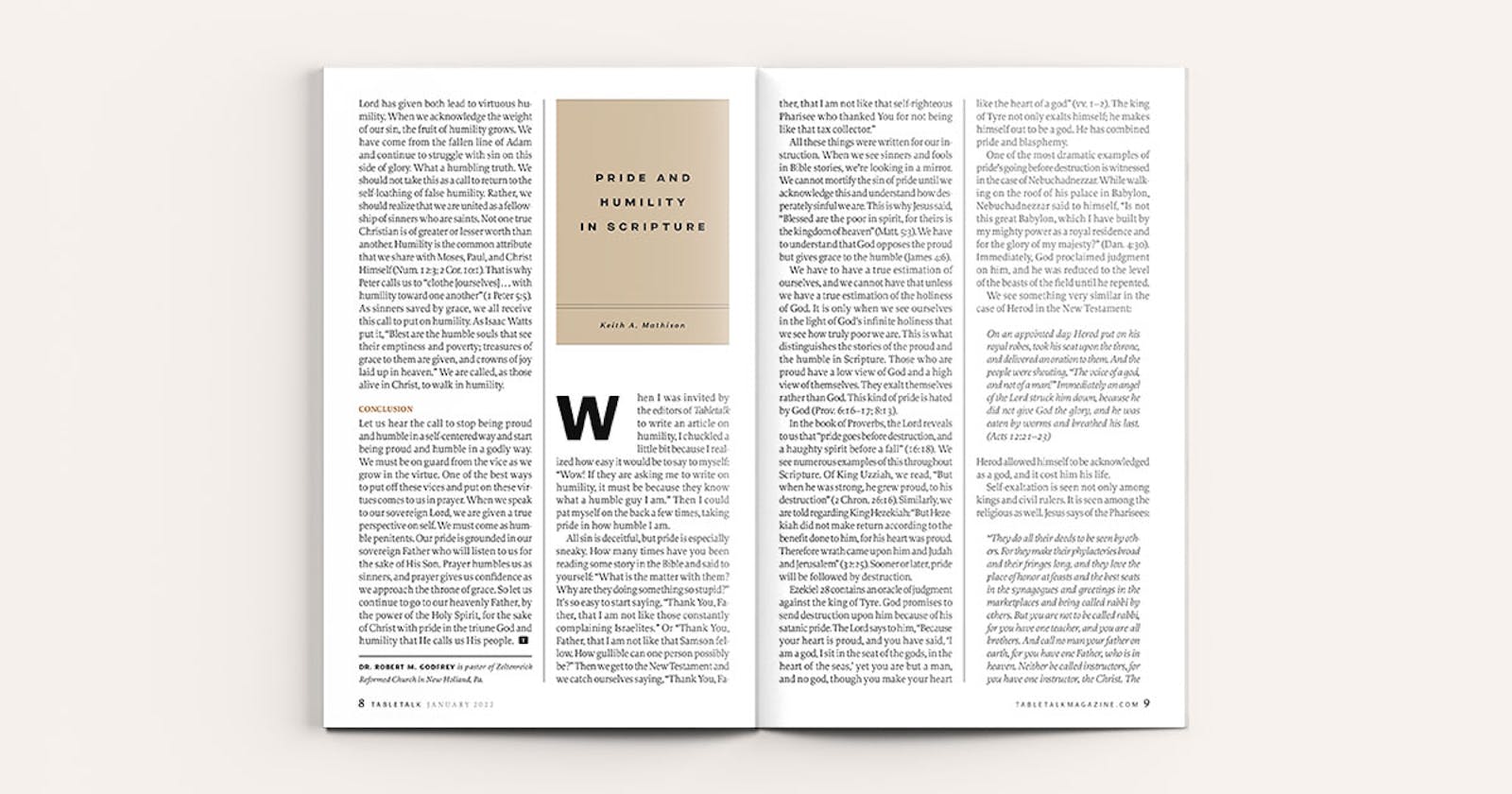
Request your free, three-month trial to Tabletalk magazine. You’ll receive the print issue monthly and gain immediate digital access to decades of archives. This trial is risk-free. No credit card required.
Try Tabletalk NowAlready receive Tabletalk magazine every month?
Verify your email address to gain unlimited access.
When I was invited by the editors of Tabletalk to write an article on humility, I chuckled a little bit because I realized how easy it would be to say to myself: “Wow! If they are asking me to write on humility, it must be because they know what a humble guy I am.” Then I could pat myself on the back a few times, taking pride in how humble I am.
All sin is deceitful, but pride is especially sneaky. How many times have you been reading some story in the Bible and said to yourself: “What is the matter with them? Why are they doing something so stupid?” It’s so easy to start saying, “Thank You, Father, that I am not like those constantly complaining Israelites.” Or “Thank You, Father, that I am not like that Samson fellow. How gullible can one person possibly be?” Then we get to the New Testament and we catch ourselves saying, “Thank You, Father, that I am not like that self-righteous Pharisee who thanked You for not being like that tax collector.”
All these things were written for our instruction. When we see sinners and fools in Bible stories, we’re looking in a mirror. We cannot mortify the sin of pride until we acknowledge this and understand how desperately sinful we are. This is why Jesus said, “Blessed are the poor in spirit, for theirs is the kingdom of heaven” (Matt. 5:3). We have to understand that God opposes the proud but gives grace to the humble (James 4:6).
We have to have a true estimation of ourselves, and we cannot have that unless we have a true estimation of the holiness of God. It is only when we see ourselves in the light of God’s infinite holiness that we see how truly poor we are. This is what distinguishes the stories of the proud and the humble in Scripture. Those who are proud have a low view of God and a high view of themselves. They exalt themselves rather than God. This kind of pride is hated by God (Prov. 6:16–17; 8:13).
In the book of Proverbs, the Lord reveals to us that “pride goes before destruction, and a haughty spirit before a fall” (16:18). We see numerous examples of this throughout Scripture. Of King Uzziah, we read, “But when he was strong, he grew proud, to his destruction” (2 Chron. 26:16). Similarly, we are told regarding King Hezekiah: “But Hezekiah did not make return according to the benefit done to him, for his heart was proud. Therefore wrath came upon him and Judah and Jerusalem” (32:25). Sooner or later, pride will be followed by destruction.
Ezekiel 28 contains an oracle of judgment against the king of Tyre. God promises to send destruction upon him because of his satanic pride. The Lord says to him, “Because your heart is proud, and you have said, ‘I am a god, I sit in the seat of the gods, in the heart of the seas,’ yet you are but a man, and no god, though you make your heart like the heart of a god” (vv. 1–2). The king of Tyre not only exalts himself; he makes himself out to be a god. He has combined pride and blasphemy.
One of the most dramatic examples of pride’s going before destruction is witnessed in the case of Nebuchadnezzar. While walking on the roof of his palace in Babylon, Nebuchadnezzar said to himself, “Is not this great Babylon, which I have built by my mighty power as a royal residence and for the glory of my majesty?” (Dan. 4:30). Immediately, God proclaimed judgment on him, and he was reduced to the level of the beasts of the field until he repented.
We see something very similar in the case of Herod in the New Testament:
On an appointed day Herod put on his royal robes, took his seat upon the throne, and delivered an oration to them. And the people were shouting, “The voice of a god, and not of a man!” Immediately an angel of the Lord struck him down, because he did not give God the glory, and he was eaten by worms and breathed his last. (Acts 12:21–23)
Herod allowed himself to be acknowledged as a god, and it cost him his life.
Self-exaltation is seen not only among kings and civil rulers. It is seen among the religious as well. Jesus says of the Pharisees:
“They do all their deeds to be seen by others. For they make their phylacteries broad and their fringes long, and they love the place of honor at feasts and the best seats in the synagogues and greetings in the marketplaces and being called rabbi by others. But you are not to be called rabbi, for you have one teacher, and you are all brothers. And call no man your father on earth, for you have one Father, who is in heaven. Neither be called instructors, for you have one instructor, the Christ. The greatest among you shall be your servant. Whoever exalts himself will be humbled, and whoever humbles himself will be exalted.” (Matt. 23:5–12)
What does it look like to be poor in spirit and to humble oneself? Jesus tells us in the parable of the Pharisee and the tax collector (Luke 18:9–14). While the Pharisee almost dislocates his shoulder and elbow patting himself on the back, the tax collector “would not even lift up his eyes to heaven, but beat his breast, saying, ‘God, be merciful to me, a sinner!’ ” (v. 13). Humility involves an accurate estimation of one’s status before God as a sinner.

There are numerous examples of true humility in Scripture. It is difficult to forget the story of Joseph. As a youth, he could sometimes be pretty full of himself. But through numerous trials and years of suffering, Joseph learned humility. This humility is on full display when Pharaoh says to Joseph, “I have heard it said of you that when you hear a dream you can interpret it” (Gen. 41:15). The young Joseph might have said yes. The humbled Joseph says, “It is not in me; God will give Pharaoh a favorable answer” (v. 16).
Moses was the greatest prophet of the Old Testament, and yet he was “very meek, more than all people who were on the face of the earth” (Num. 12:3). He submitted himself to God faithfully.
David, however, may be the clearest example of humility in the Old Testament. He was certainly not perfect. He made his fair share of blunders. In some cases, he fell into heinous sins such as adultery and even murder. But what sets David apart is that when he fell, he genuinely and humbly repented. He didn’t proudly try to justify himself. He fell on the mercy of God because he understood that God is God and that he is not. We see this from the moment God made His covenant with David. David responded, “Who am I, O LORD God, and what is my house, that you have brought me thus far?” (2 Sam. 7:18). He didn’t conclude that he was something special. He didn’t exalt himself. He recognized the sovereign grace of God in choosing him.
When we turn to the New Testament, we are immediately presented with a beautiful example of humility in the case of Jesus’ mother Mary. After the angel announced to her who her son would be, Mary did not exalt herself. She exalted God, saying: “My soul magnifies the Lord, and my spirit rejoices in God my Savior, for he has looked on the humble estate of his servant. For behold, from now on all generations will call me blessed” (Luke 1:46–48).
In the Apostle Paul, we see one who had been given a great mission and a great role in the church of Jesus Christ, but Paul never forgot who he was and what he had been. More than once he spoke of himself as the least of the Apostles and the least of the saints because he had persecuted the church (1 Cor. 15:9; Eph. 3:8). At one point, he even referred to himself as the greatest of sinners (1 Tim. 1:15). He understood that but for the grace of God, he would have suffered the wrath of God. But he did not allow this to immobilize him in a sea of despair. He rejoiced in God’s grace and faithfully did what Jesus had called him to do.
The greatest example of humility in Scripture is the Lord Jesus Christ. We are instructed to follow His example. Like Jesus, we are to “do nothing from selfish ambition or conceit, but in humility count others more significant than [ourselves]” (Phil. 2:3). We are to “look not only to [our] own interests, but also to the interests of others” (v. 4). Imagine what the church might look like if Christians would begin to do this in significant numbers.
